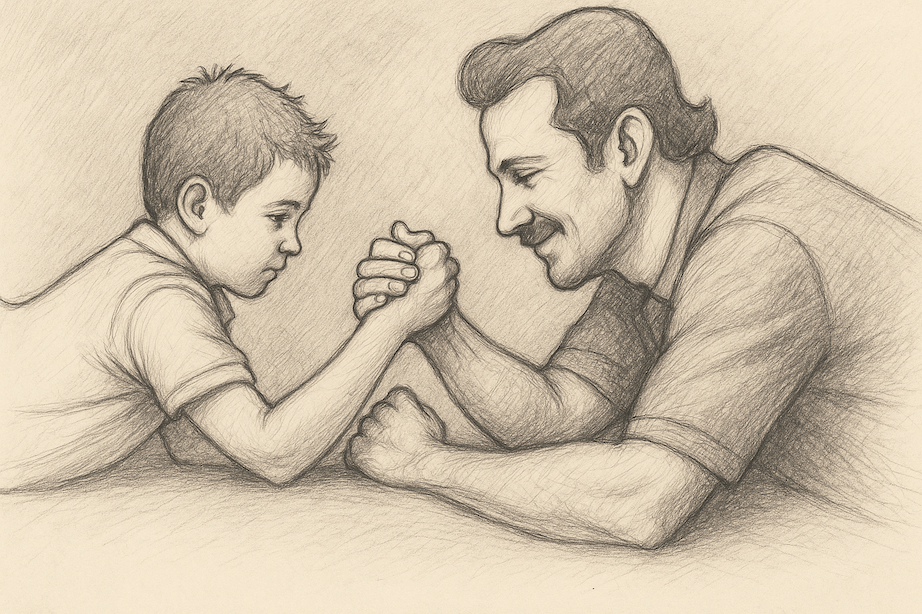The things our fathers couldn’t finish become the things we must learn to stay with.
My father used to say, “You gotta wanna.”
He wrote it on scraps of wood and old boxes.
Sometimes he’d sit with us while we absorbed those words, not really knowing what he meant by them at nine years old.
That was his gospel — the belief that everything depended on will.
He was right, in a way. But he left out the other half of the story:
what happens when you don’t want to — and life still asks you to stay?
The Sander
When I was a boy, he once brought home a manual sander, the kind with permanent sandpaper. But he never brought any wood.
It sat unused for years, a quiet monument to all the things that could have been made.
He was always dreaming big, reaching for the next idea.
But he rarely built the small things that hold a big idea up.
He chased the horizon before laying the foundation.
What I needed wasn’t the sander. I needed him beside me — to sit down, pick up a piece of wood, and finish one small thing together, from start to end.
That, I think, is part of what fathers are meant to teach: how to stay with hard things, not just how to imagine them.
The Shadow
His father — my grandfather — was a maths professor in Zimbabwe. Brilliant, respected, exacting.
That shadow must have weighed on him.
Instead of trying to measure up, my father learned to sidestep the test.
Control became a form of safety.
He had real endurance, when it was on his own terms.
He trained for years to earn his black belt in karate. He could push through pain, repetition, fatigue.
But when someone else set the terms — when the work wasn’t freely chosen or when visibility came with the risk of judgment, his will turned brittle.
I remember him helping my mother in her shop late into the night, cutting fabric by the metre.
He did what needed to be done, but with quiet resentment.
It wasn’t effort he lacked — it was trust in being seen while trying,
and in believing that his voice, his contribution, mattered.
That he mattered.
That was the tragedy, that somewhere along the way,
he stopped believing his life counted for something.
He believed you have to want to — but mostly when the wanting stayed private, protected from the eyes of others.
When exposure entered, he’d retreat, withholding his best work from the very places it might have mattered most.
The Battle of Will
His will was both shield and trap.
He resisted being told what to do, even when he agreed.
It was easier to hold onto principle than to risk failing in full view.
There were so many thresholds he couldn’t cross because of that incomplete belief —
moments that asked for surrender, not stubbornness.
When forced, he complied reluctantly; when free, he sometimes turned away.
It was a constant tug between pride and fear, control and closeness.
The Inheritance
That’s what he passed down — not absence, but ambivalence.
He was loving, affectionate, warm. He told us he loved us.
But he never showed us how to endure difficulty without bitterness.
When I was sixteen, I saw it in myself.
I was losing badly at tennis, and instead of staying in the fight, I started pretending not to care.
It was like watching him play through me — choosing pride over persistence.
What I needed to hear that day was simple:
You can love something and not be brilliant.
You can fail and still build something.
You can stand up, brush off the dust, and try again.
The Turning
That part of me still flinches from trying, afraid of what it might expose.
But in honour of my father, I’ve spent my life walking toward the hard things —
learning to stay, learning to fail, and learning to begin again.
The mountains helped me.
I found what I needed in vision quests — four days and nights alone on the land.
I started when I was twenty-nine and finished when I was forty-three.
My last was thirteen days on a mountain, alone.
Those mountains taught me what he couldn’t:
how to stay when every part of you wants to leave.
How to sit with hunger, thirst, fear, and the voice that says you’re not enough.
How to meet yourself at the threshold — and not turn away.
They didn’t just teach me to stay.
They taught me why to stay.
The Completion
He was right, in his way. You do have to want to.
But will alone isn’t devotion.
Without purpose, will hardens into resistance — a fight against life instead of for it.
Looking back, I see how he shaped me — not just through what he gave, but through what he withheld.
He taught me, by contrast, the beauty of perseverance.
Yes, he should have built more, stayed longer, risked being seen.
But he also did the best he could with what he had.
And maybe that’s the work of the next generation —
to pick up what was dropped, to soften what was rigid,
to turn the battle of will into the art of staying.
The Blessing
If my father had given me a sander and sat beside me,
if we’d made one small table together,
our story might have been different.
But there’s a quiet poetry that only time and heartbreak can make.
So I take you as the father for me.
I love you as you were, Dad.
And I needed so much more.
Thankfully, that so much more is now my responsibility.
The threshold is mine to cross.
The sander is still waiting.
